形容词比较级总结
小学英语形容词比较级总结大全

英语形容词比较级(一)一般句式的构成:A + is / are+ 形容词比较级+ than + BA 是主格B 是宾格如:She is taller than me.主格+ be + 形容词比较级+ than + 宾格(二)英语形容词比较级的构成英语形容词比较等级有三个:原级,比较级和最高级。
形容词比较等级形式变化有规则的和不规则的两种。
规则变化:1)单音节词末尾加-er(比较级),-est(最高级)【例】原级比较级最高级great greater greatestsmall smaller smallestclean cleaner cleanest2)单音节如以e结尾,只加-r(比较级),-st(最高级)【例】fine finer finestnice nicer nicestwide wider widest3)闭音节单音节词如末尾只有一个辅音字母,须先双写这个辅音字母,再加-er (比较级),-est(最高级)【例】big bigger biggesthot hotter hottestred redder reddest4)少数以-y,-er,ow,-ble结尾的双音节词,末尾加-er(比较级),-est(最高级)。
以-y结尾的词,如-y前是辅音字母,则变y为-i,再加-er和-est。
以-e结尾的词只加-r和-st。
【例】clever cleverer cleverestnarrow narrower narrowestable abler ablesteasy easier easiest5)其它双音节和多音节词皆在前面加单词more和most。
【例】careful more careful most carefuldifficult more difficult most difficultdelicious more delicious most delicious不规则变化:原级比较级最高级good/well better bestbad worse worstmany/much more mostlittle less leastfar farther/further farthest/furthest注:有些形容词一般没有比较等级。
英语形容词的比较级和最高级整理

英语形容词的比较级和最高级整理常规:1、一般直接在词尾加er;est.tall---taller---the tallestgreat---greater---the greatest2、以字母e结尾的直接加r;stnice---nicer---the nicestfine---finer---the finest3、以辅音字母加y结尾的形容词变y为i再加er;estbusy---busier---the busiestheavy---heavier---the heaviest4、重读闭音节结尾的单音节词,若词尾只有一个辅音字母时,须双写这个辅音字母再加er;estbig-bigger-the biggesthot -hotter-the hottest5、少数以-y,-er,-ow,-ble结尾的双音节词,末尾加-er^D-est(以-y 结尾的词,如-y前是辅音字母,则变y为i,再加-er和-est;以-e 结尾的词仍只加-r和-st)happy—happier—happiestclever—cleverer—cleverest5、多音节和部分双音节词在词前加more、mosteasily--more easily--most easilybeautiful--more beautiful--the most beautiful特殊:(1 )有些单音节词的比较等级常用more和most,如glad,fond,shy,sly(但like 只可用more 和most)。
Eg:I am not more glad than you.我可没像你那样高兴。
Uncle Jack was more like a book of reference to my father.杰克大叔对我父亲来说真是一部参考书。
(2)有些单音节词用-er和-est或more和most皆可,如free,clear 等。
Eg:I'm clearer/more clear about it than before.对这事,我比以前更清楚了。
六年级知识要点总结 形容词比较级知识总结
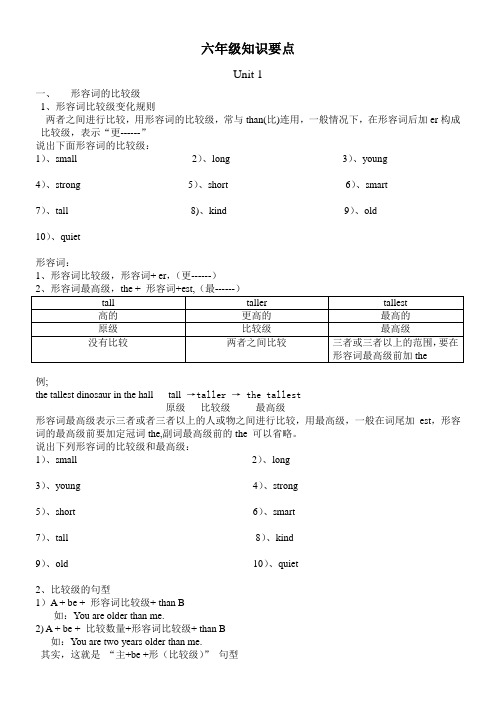
六年级知识要点Unit 1一、形容词的比较级1、形容词比较级变化规则两者之间进行比较,用形容词的比较级,常与than(比)连用,一般情况下,在形容词后加er构成比较级,表示“更------”说出下面形容词的比较级:1)、small __________ 2)、long __________ 3)、young __________ 4)、strong __________ 5)、short __________ 6)、smart __________ 7)、tall __________ 8)、kind __________ 9)、old __________ 10)、quiet __________形容词:1、形容词比较级,形容词+ er,(更------)例;the tallest dinosaur in the hall tall→taller → the tallest原级比较级最高级形容词最高级表示三者或者三者以上的人或物之间进行比较,用最高级,一般在词尾加est,形容词的最高级前要加定冠词the,副词最高级前的the 可以省略。
说出下列形容词的比较级和最高级:1)、small __________ __________ 2)、long __________ __________3)、young __________ __________ 4)、strong __________ __________5)、short __________ __________ 6)、smart __________ __________7)、tall __________ __________ 8)、kind __________ __________9)、old __________ __________ 10)、quiet __________ __________2、比较级的句型1)A + be + 形容词比较级+ than B如:You are older than me.2) A + be + 比较数量+形容词比较级+ than B如:You are two years older than me.其实,这就是“主+be +形(比较级)”句型知识拓展:比较级和最高级要同类之间进行比较Zhang Peng’s bag is bigger than Sarah’s bag. = Zhang Peng’s bag is bigger than Sarah’s. 名词所有格所修饰的词,如果前面有提到过,往往可以省略,避免重复。
形容词比较级常用词总结
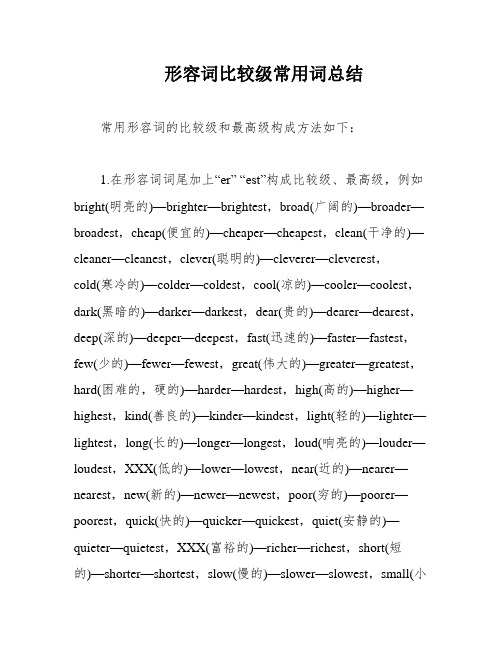
形容词比较级常用词总结常用形容词的比较级和最高级构成方法如下:1.在形容词词尾加上“er” “est”构成比较级、最高级,例如bright(明亮的)—brighter—brightest,broad(广阔的)—broader—broadest,cheap(便宜的)—cheaper—cheapest,clean(干净的)—cleaner—cleanest,clever(聪明的)—cleverer—cleverest,cold(寒冷的)—colder—coldest,cool(凉的)—cooler—coolest,dark(黑暗的)—darker—darkest,dear(贵的)—dearer—dearest,deep(深的)—deeper—deepest,fast(迅速的)—faster—fastest,few(少的)—fewer—fewest,great(伟大的)—greater—greatest,hard(困难的,硬的)—harder—hardest,high(高的)—higher—highest,kind(善良的)—kinder—kindest,light(轻的)—lighter—lightest,long(长的)—longer—longest,loud(响亮的)—louder—loudest,XXX(低的)—lower—lowest,near(近的)—nearer—nearest,new(新的)—newer—newest,poor(穷的)—poorer—poorest,quick(快的)—quicker—quickest,quiet(安静的)—quieter—quietest,XXX(富裕的)—richer—richest,short(短的)—shorter—shortest,slow(慢的)—slower—slowest,small(小的)—smaller—smallest,smart(聪明的)—smarter—smartest,soft(柔软的)—softer—softest,strong(强壮的)—stronger—strongest,sweet(甜的)—sweeter—sweetest,tall(高的)-taller-tallest。
形容词比较级归纳
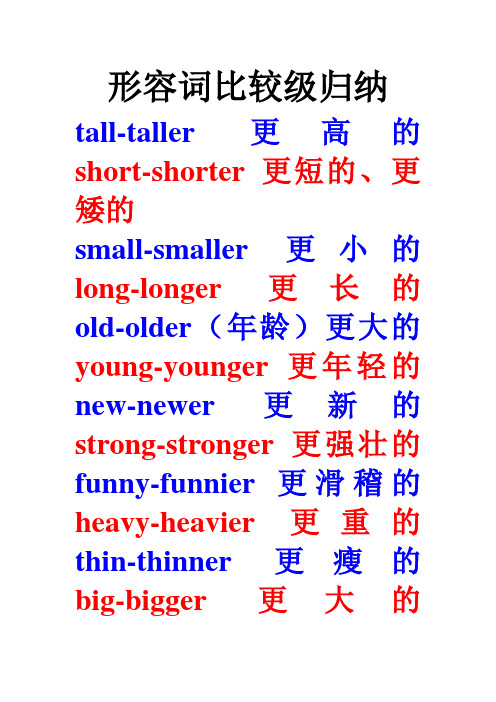
形容词比较级归纳tall-taller更高的short-shorter 更短的、更矮的small-smaller 更小的long-longer 更长的old-older(年龄)更大的young-younger 更年轻的new-newer 更新的strong-stronger 更强壮的funny-funnier 更滑稽的heavy-heavier 更重的thin-thinner 更瘦的big-bigger 更大的good/well-better 更好的many/much-more 更多的动词过去式归纳wash-washed 洗visit-visited 看望clean-cleaned 打扫watch-watched 看play-played 玩water-watered 浇水listen-listened 听cook-cooked 做(饭)walk-walked 走jump-jumped 跳return-returned 送回,归还climb-climbed 爬learn-learned 学习work-worked 工作ski-skied 滑雪row-rowed 划(船)relax-relaxed 放松show-showed 展示look-looked 看stay-stayed 待,停留ask-asked 问call-called 打(电话)taste-tasted 品尝dance-danced 跳舞prepare-prepared 准备arrive-arrived 抵达go skiing-went skiing 去滑雪go ice-skating-wentice-skating 去滑冰leave-left 离开get-got 得到,到达tell-told 告诉,讲述run-ran 跑say-said 说will-would 将要come-came 来lose-lost丢失find-found 找到drink-drank 喝wear-wore 穿,戴write-wrote 写do-did 做,干(助动词)go-went 去see-saw 看见am/is-was 是are-were 是read-read 读,阅读study-studied 学习fly-flew 放,飞swim-swam 游泳buy-bought 买take-took照,拍eat-ate 吃sing-sang 唱make-made 制作have/has-had 有,吃,举行,玩动词ing形式归纳do-doing 做、干read-reading 读draw-drawing 画cook-cooking 做(饭)ask-asking 问answer-answering 回答talk-talking 说listen-listening 听clean-cleaning 打扫wash-washing 洗wear-wearing 穿work-working 工作play-playing 玩watch-watching 观看sleep-sleeping 睡觉leap-leaping 跳跃fight-fighting 打架climb-climbing 爬fly-flying 飞jump-jumping跳walk-walking 走eat-eating 吃drink-drinking 喝swing-swinging 荡秋千look-looking 看pick-picking 采摘catch-catching 抓住collect-collecting 收集count-counting 数go-going 去sing-singingwrite-writing 写come-coming 来bite-biting 咬snore-snoring打呼噜take-taking 拍(照)have-having 吃、喝leave-leaving 离开ride-riding 骑drive-driving驾驶、开make-making 制作dance-dancing 跳舞live-living 居住dive-diving 跳水run-running 跑swim-swimming 游泳shop-shopping 购物put-putting 放动词第三人称单数形式归纳sell-sells 卖clean-cleans 打扫draw-draws 画work-works 工作like-likes 喜欢play-plays 玩write-writes 写see-sees 看见become-becomes 变成live-lives 居住feel-feels 感觉think-thinks 想、思考read-reads 读collect-collects 收集help-helps 帮助do-does 做、干go-goes 去teach-teaches 教watch-watches 观看wash-washes 洗try-tries 尝试fly-flies 飞cry-cries 哭have-has有are-is 是。
形容词比较级
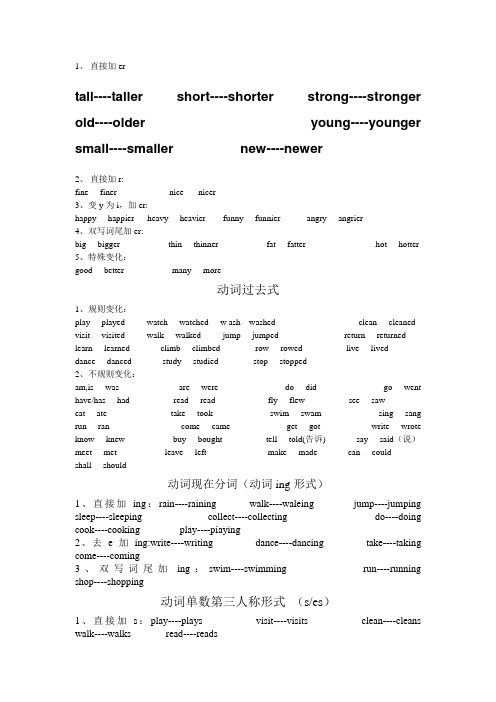
1、直接加ertall----taller short----shorter strong----stronger old----older young----younger small----smaller new----newer2、直接加r:fine----finer nice-----nicer3、变y为i,加er:happy----happier heavy----heavier funny----funnier angry----angrier4、双写词尾加er:big----bigger thin----thinner fat----fatter hot----hotter 5、特殊变化:good----better many----more动词过去式1、规则变化:play----played watch----watched -w ash---washed clean----cleaned visit----visited walk----walked jump----jumped return----returned learn----learned climb----climbed row----rowed live----liveddance----danced study----studied stop----stopped2、不规则变化:am,is----was are----were do----did go----went have/has----had read----read fly----flew see----saweat----ate take----took swim----swam sing----sang run----ran come----came get----got write----wrote know----knew buy----bought tell----told(告诉) say----said(说)meet----met leave----left make----made can----couldshall----should动词现在分词(动词ing形式)1、直接加ing:rain----raining walk----waleing jump----jumping sleep----sleeping collect----collecting do----doing cook----cooking play----piaying2、去e加ing:write----writing dance----dancing take----taking come----coming3、双写词尾加ing:swim----swimming run----running shop----shopping动词单数第三人称形式(s/es)1、直接加s:play----plays visit----visits clean----cleans walk----walks read----reads2、以e结尾直接加s:take----takes write----writes dance----dances come----comes3、以o、s、x、ch、sh结尾加es:watch----watches teach----teaches wash----watches teach----teaches wash----washes go----goes do----does4、以辅音字母加“y”变“i”,然后加“es”:fly----flies study----studies。
形容词的比较级、过去式总结

形容词的比较级:
1、两个事物或人的比较用比较级,比较级后面一般带有单词than。
than后的人称代词用宾格。
结构:形容词+er than...
2.形容词加er的规则:
⑴直接在词尾加er ;如:tall --- taller
⑵以字母e 结尾,加r ;如:nice---nicer
⑶以“辅音字母+y”结尾,变y变i,再加er 。
如:heavy----heavier
⑷重读,辅元辅,双写末尾的辅音字母,再加er ;如:big--- bigger thin---- thinner 3.不规则形容词比较级:good/well-----better
例句:(1).It's taller than both of us together.它比我俩加起来还高。
(2).Your feet are bigger than mine.你的脚比我的大。
(3). I’m heavier than you.我比你重。
过去式规则变化
(1)直接+“ed ”。
如:walk →walked(走)
(2)以字母e 结尾,加“-d”。
如:live →lived (住)like →liked (喜欢)
(3)以“辅音字母+y”结尾,变y变i,再加ed ;
若是词尾为“元音字母+y”,只加“ed ”。
如:study →studied (学习)play→played (游戏)
(4)原形动词词尾为重读闭音节时,先双写该辅音字母再+ “ed”
如:stop →stopped(停止)。
形容词的比较级和最高级大全
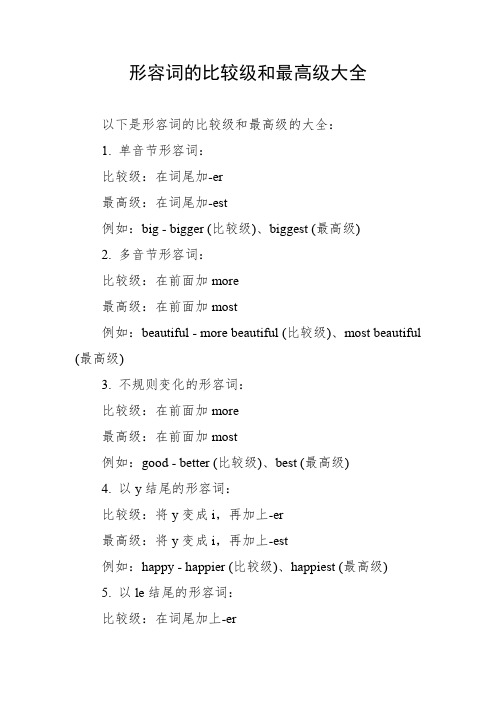
形容词的比较级和最高级大全以下是形容词的比较级和最高级的大全:1. 单音节形容词:比较级:在词尾加-er最高级:在词尾加-est例如:big - bigger (比较级)、biggest (最高级)2. 多音节形容词:比较级:在前面加more最高级:在前面加most例如:beautiful - more beautiful (比较级)、most beautiful (最高级)3. 不规则变化的形容词:比较级:在前面加more最高级:在前面加most例如:good - better (比较级)、best (最高级)4. 以y结尾的形容词:比较级:将y变成i,再加上-er最高级:将y变成i,再加上-est例如:happy - happier (比较级)、happiest (最高级)5. 以le结尾的形容词:比较级:在词尾加上-er最高级:在词尾加上-est例如:possible - more possible (比较级)、most possible (最高级)6. 少数不规则变化的形容词:比较级:在前面加more最高级:在前面加most例如:famous - more famous (比较级)、most famous (最高级)7. 特殊的比较级和最高级:例如:well - better (比较级)、best (最高级)8. 副词的比较级和最高级:比较级:在后面加-er最高级:在后面加-est例如:slowly - more slowly (比较级)、most slowly (最高级)以上是常见的形容词的比较级和最高级,但是也有一些不规则变化的形容词需要记忆。
同时,需要注意的是,有些形容词没有比较级和最高级,如unique。
形容词比较级常用词总结(精品)

形容词原形一比较圾一最高级(-)规则变化1 . big -bigger -the biggest 大的-更大的-最大的2 . small - smaller - the smallest小的-更小的-最小的3 . tall - taller - the tallest高的-更高的-最高的4 . long -longer - the longest长的-更长的-最长的5 . short-shorter-the shortest短(矮)的-更短(矮)的-最短(矮)的6 . old - older - the oldest老(旧)的一更老(旧)的-最老(旧)的7 . young-younger - the youngest年轻的-更年轻的一最年轻的8. weak - weaker - the weakest虚弱的一更虚弱的-最虚弱的9. strong- stronger- the strongest强壮的-更强壮的一最强壮的1 0 . quick - quicker-quickest快的-更快的一最快的ll , fast -faster - the fastest快的-更快的一最快的1 2 . slow - slower -slowest慢的一更慢的-最慢的1 3 . fat - fatter -the fattest胖的一更胖的-最胖的1 4 . thin - thinner - the thinnest瘦的-更瘦的-最瘦的1 5 . hot - hotter - the hottest热的-更热的-最热的1 6 . cold - colder - the coldest冷的-更冷的-最冷的1 7. cool - cooler - the coolest凉爽的-更凉爽的-最凉爽的18. warm - warmer - the warmest温暖的-更温暖的-最温暖的1 9. clean -leaner - the cleanest干净的一更干净的-最干净的2 0 . dirty - dirtier - the dirtiest脏的-更脏的-最脏的2 1 . happy - happier - the happiest高兴的一更高兴的-最高兴的2 2 . sad - sadder . the saddest伤心的一更位心的-最伤心的2 3 . fine - finer - the finest好的-更好的-最好的2 4 . ugly - uglier the ugliest丑的-更丑的-最丑的2 5 . high - higher - the highest高的一更高的-最高的2 6 . large - larger - the largest大的一更大的-最大的2 7 . loud - louder - the loudest大声的-更大声的-最大声的2 8 . quiet - quieter - the quietest安静的-更安静的-最安静的2 9. easy - easier - the easiest简单的一更简单的-最简单的多音节形容词比较级,最高级1.beautiful - more beautiful美丽的-更美丽的-the most beautiful最美丽的2. difficult- more difficult 难的一更难的-the most difficult 最难的3.delicious - more delicious 美味的一更美味的-the most delicious 最美味的4. interesting - more interesting有趣的一更有趣的-The most interesting 最有趣的5.boring - more boring无聊的一更无聊的-the most boring最无聊的6.friendly - more friendly 友好的一更友好的-the most friendly最友好的7.important -more important 重要的一更重要的-the most important 最重要的8.popular - more popular流行的一更流行的-the most popular 最流行的9.exciting - more exciting兴奋的一更兴奋的-the most exciting 最兴奋的10.expensive - more expensive贵的一更贵的-the most expensive最贵的11.different -more different不同的一更不同的-the most different最不同的12.quickly - more quickly 快地一更快地-the most quickly 最快地13.slowly - more slowly慢地一更慢地-the most slowly最馒地14.famous - more famous 著名的一更著名的-he most famous 最著名的15. careful -more careful 认真的一更认真的-the most careful 最认真的。
形容词的比较级大全
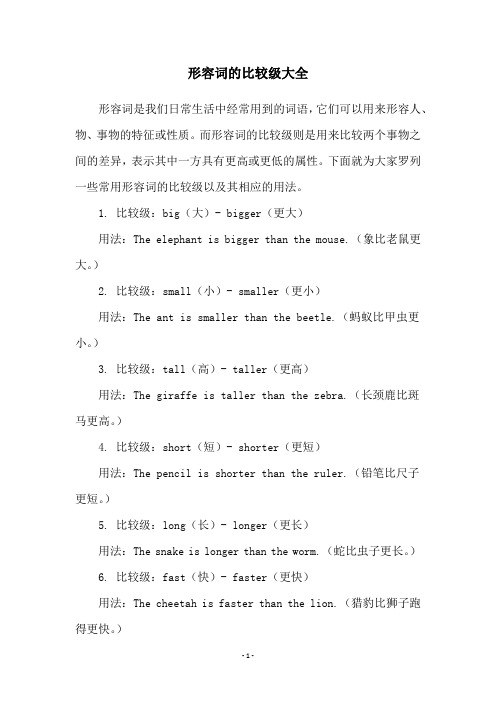
形容词的比较级大全形容词是我们日常生活中经常用到的词语,它们可以用来形容人、物、事物的特征或性质。
而形容词的比较级则是用来比较两个事物之间的差异,表示其中一方具有更高或更低的属性。
下面就为大家罗列一些常用形容词的比较级以及其相应的用法。
1. 比较级:big(大)- bigger(更大)用法:The elephant is bigger than the mouse.(象比老鼠更大。
)2. 比较级:small(小)- smaller(更小)用法:The ant is smaller than the beetle.(蚂蚁比甲虫更小。
)3. 比较级:tall(高)- taller(更高)用法:The giraffe is taller than the zebra.(长颈鹿比斑马更高。
)4. 比较级:short(短)- shorter(更短)用法:The pencil is shorter than the ruler.(铅笔比尺子更短。
)5. 比较级:long(长)- longer(更长)用法:The snake is longer than the worm.(蛇比虫子更长。
) 6. 比较级:fast(快)- faster(更快)用法:The cheetah is faster than the lion.(猎豹比狮子跑得更快。
)7. 比较级:slow(慢)- slower(更慢)用法:The turtle is slower than the rabbit.(乌龟比兔子跑得更慢。
)8. 比较级:easy(容易)- easier(更容易)用法:The multiple-choice test is easier than the essay test.(选择题比论述题更容易。
)9. 比较级:difficult(困难)- more difficult(更困难)用法:Calculus is more difficult than algebra.(微积分比代数更困难。
初三知识点总结形容词的比较级与最高级

初三知识点总结形容词的比较级与最高级形容词是我们日常交流中经常使用的词汇,它可以用来描述人、事、物的性质和特征。
在表达时,我们常使用形容词的比较级和最高级来进行更加准确的描述和比较。
本文将对初三学生所需掌握的形容词的比较级与最高级进行总结介绍。
一、形容词比较级的构成形容词的比较级表示一种对比关系,通常比较两个人或两个事物的特征。
构成比较级有以下三种情况:1. 单音节和部分双音节形容词,在其后面直接加上-er,例如:- 高(tall)——更高(taller)- 大(big)——更大(bigger)2. 以字母“e”结尾的形容词,在其后面加上-r,例如:- 近(close)——更近(closer)- 矮(short)——更矮(shorter)3. 多数双音节和所有三音节或更多音节的形容词,在其前面加上more,例如:- 漂亮(beautiful)——更漂亮(more beautiful)- 有趣(interesting)——更有趣(more interesting)二、形容词最高级的构成形容词的最高级表示一种最高程度的比较,通常比较三个或三个以上的人或事物的特征。
构成最高级有以下三种情况:1. 单音节和部分双音节形容词,在其后面直接加上-est,例如:- 高(tall)——最高(tallest)- 大(big)——最大(biggest)2. 以字母“e”结尾的形容词,在其后面加上-st,例如:- 近(close)——最近(closest)- 矮(short)——最矮(shortest)3. 多数双音节和所有三音节或更多音节的形容词,在其前面加上the most,例如:- 漂亮(beautiful)——最漂亮(the most beautiful)- 有趣(interesting)——最有趣(the most interesting)三、形容词比较级与最高级的用法1. 当两个人或事物进行比较时,我们使用比较级。
形容词比较级常用词总结 - 形容词比较级常用词总结的特点
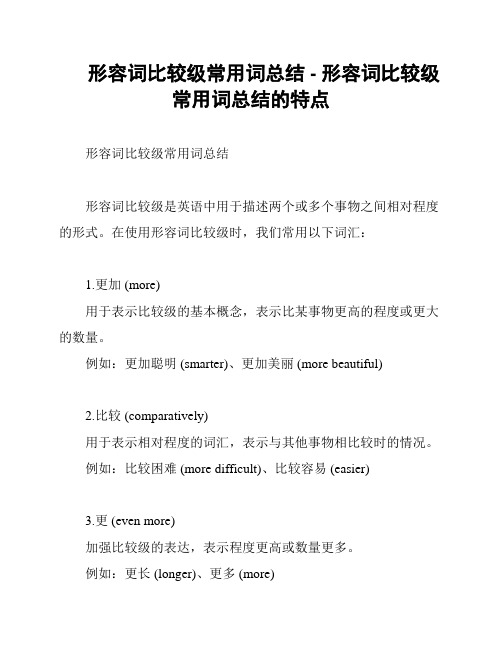
形容词比较级常用词总结 - 形容词比较级
常用词总结的特点
形容词比较级常用词总结
形容词比较级是英语中用于描述两个或多个事物之间相对程度的形式。
在使用形容词比较级时,我们常用以下词汇:
1.更加 (more)
用于表示比较级的基本概念,表示比某事物更高的程度或更大的数量。
例如:更加聪明 (smarter)、更加美丽 (more beautiful)
2.比较 (comparatively)
用于表示相对程度的词汇,表示与其他事物相比较时的情况。
例如:比较困难 (more difficult)、比较容易 (easier)
3.更 (even more)
加强比较级的表达,表示程度更高或数量更多。
例如:更长 (longer)、更多 (more)
4.较 (rather)
用于弱化比较级的表达,表示程度稍低或数量较少。
例如:较好 (better)、较少 (fewer)
5.更多 (more)
表示数量或程度更大。
例如:更多人 (more people)、更多知识 (more knowledge)
6.更少 (less)
表示数量或程度更小。
例如:更少时间 (less time)、更少金钱 (less money)
请注意,这仅是一些常用的形容词比较级词汇总结,实际使用时还应根据具体语境选择合适的词汇。
记住,形容词比较级是相对的,需要根据所比较的事物来决定使用哪种词汇。
希望这份简要总结对你有帮助!。
【语法】常见的形容词比较级和最高级总结
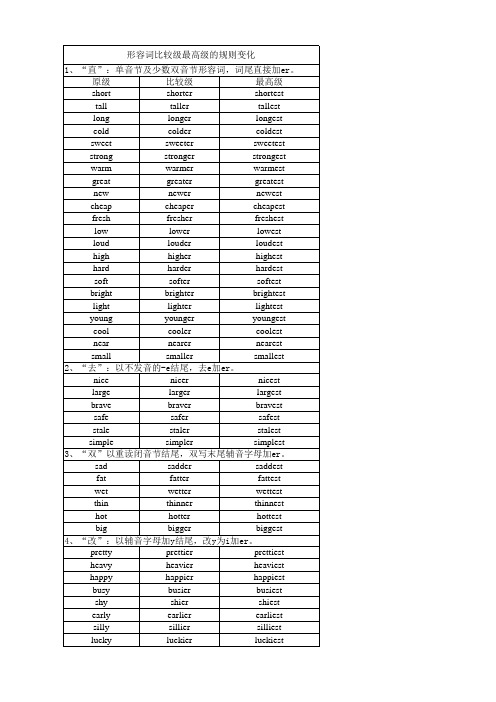
1、最高级在使用时要在前面加the。
2、不是所有形容词都有比较级和最高级。
3、学习要循序渐进,逐步积累,希望大家慢慢学会自己总
结!
more lively
most lively
interesting
more interesting
2、特殊形式的比较级和最高级。
most interesting
good/well
better
best
bad/ill/badly
worse
worst
far
farther/further
farthest/furthest
smallest
2、“去”:以不发音的-e结尾,去e加er。
nice
nicer
nicest
large
larger
largest
brave
braver
bravest
safe
safer
safest
stale
staler
stalest
simple
simpler
simplest
3、“双”以重读闭音节结尾,双写末尾辅音字母加er。
prettiest heaviest happer
shiest
early
earlier
earliest
silly lucky
sillier luckier
silliest luckiest
easy
easier
easiest
形容词比较级最高级的特殊变化 1、多音节及大部分双音节形容词,加more和the most。
stronger warmer greater newer
形容词比较级规律总结

形容词比较级规律总结-标准化文件发布号:(9556-EUATWK-MWUB-WUNN-INNUL-DDQTY-KII一.形容词比较级的规则变化规律:1,一般形容词直接加er,如:Small—smaller—the smallest old—older---the oldestShort—shorter—the shortest tall—taller—the tallestLong—longer—the longest fast—faster—the fastestCold—colder—the coldest new—newer—the newest2,以e结尾的形容词直接加r,如:Wide—wider—the widest nice—nicer—the nicest3,以元音字母+辅音字母结尾的形容词,双写词尾字母加er,如:Big—bigger—the biggest fat—fatter—the fattestHot---hotter---the hottest wet—wetter---the wettest4,以y结尾的形容词要去掉y,加ier,如:Happy---happier—happiest heavy---heavier---heaviestdry---drier---the driest5,多音节词,部分双音节形容词前加more变比较级,加the most变最高级,如:Beautiful—more beautiful—the most beautiful二.形容词比较级的不规则变化:good/well--better--bestbad—worse—worstmany/much—more—mostlittle—less—least。
形容词比较级总结

形容词⽐较级总结形容词⽐较级形容词⽐较级在⼋年级上是⼀个⼤的语法项⽬,在历年的中招考试单项选择中必有⼀题,⽽且出题⽅法相当灵活。
⽽现⾏课本只有A>B结构,这就要求⽼师在平时的教学中善于归纳总结,考虑周全,在教会学⽣基本结构的同时,适当进⾏拓展。
⼀.形容词⽐较级的变化规则:1. ⼀般情况直接+er2. 以e结尾的+r eg: nice, large,fine, late, cute3. 以⼀个辅⾳字母结尾的重读闭⾳节双写尾辅⾳字母+er eg: fat, thin, big, hot, red, wet, sad4. 以⼀个辅⾳字母加y结尾的改y为i+er eg: happy, healthy, angry, hungry, early, busy, curly5. 三个及三个⾳节以上的多⾳节词及两个⾳节的派⽣词在它的前⾯加moreeg : athletic, quickly, interesting, difficult, beautiful, delicious, serious, popular, quickly, lovely.不规则变化:good—better well—better bad—worse badly—worse ill—worse little—less far—farther/ further old—older/ elder练习: 写出下列词的形容词⽐较级:high- tall- short- slow- tired- boring-often- few- clean- fine- late- nice-big- thin- fat- easy- funny- early- beautiful- interesting- outgoing- comfortable- successful-good- bad- fast- badly- many-far- important- old- tall--- quiet---heavy-- outgoing--- athletic--- interesting--- different---⼆.形容词⽐较级基本句型:1. 主语+be+形容词的⽐较级+than +…Tina is taller than Tera.She is quieter than he \ him.Pedro is funnier than Paul.My pen is nicer than his.Tom is more athletic than Sam.My father is more serious than my mother.2. 形容词⽐较级前还可⽤much, a lot, even, still, a little, 来修饰, 表⽰“…的多”, “甚⾄…”, “更…”, “…⼀些”。
形容词比较级大全总结
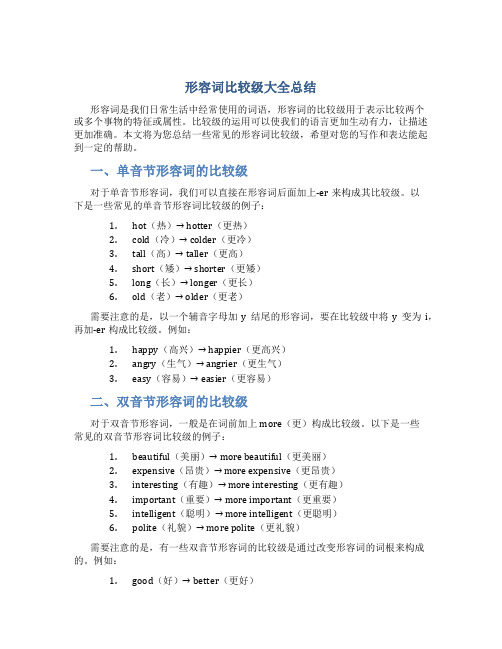
形容词比较级大全总结形容词是我们日常生活中经常使用的词语,形容词的比较级用于表示比较两个或多个事物的特征或属性。
比较级的运用可以使我们的语言更加生动有力,让描述更加准确。
本文将为您总结一些常见的形容词比较级,希望对您的写作和表达能起到一定的帮助。
一、单音节形容词的比较级对于单音节形容词,我们可以直接在形容词后面加上-er来构成其比较级。
以下是一些常见的单音节形容词比较级的例子:1.hot(热)→ hotter(更热)2.cold(冷)→ colder(更冷)3.tall(高)→ taller(更高)4.short(矮)→ shorter(更矮)5.long(长)→ longer(更长)6.old(老)→ older(更老)需要注意的是,以一个辅音字母加y结尾的形容词,要在比较级中将y变为i,再加-er构成比较级。
例如:1.happy(高兴)→ happier(更高兴)2.angry(生气)→ angrier(更生气)3.easy(容易)→ easier(更容易)二、双音节形容词的比较级对于双音节形容词,一般是在词前加上more(更)构成比较级。
以下是一些常见的双音节形容词比较级的例子:1.beautiful(美丽)→ more beautiful(更美丽)2.expensive(昂贵)→ more expensive(更昂贵)3.interesting(有趣)→ more interesting(更有趣)4.important(重要)→ more important(更重要)5.intelligent(聪明)→ more intelligent(更聪明)6.polite(礼貌)→ more polite(更礼貌)需要注意的是,有一些双音节形容词的比较级是通过改变形容词的词根来构成的。
例如:1.good(好)→ better(更好)2.bad(坏)→ worse(更坏)3.little(小)→ less(更小)三、三音节及以上形容词的比较级对于三音节及以上的形容词,一般也是在词前加上more(更)构成比较级,或者通过改变形容词的词根来构成比较级。
形容词比较级
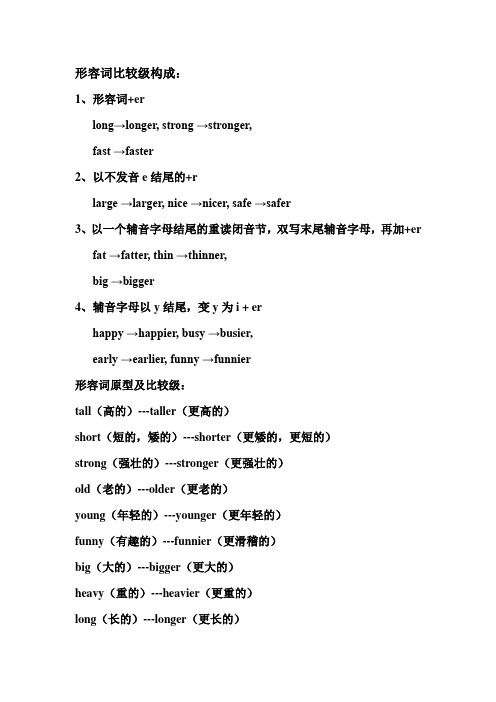
形容词比较级构成:1、形容词+erlong→longer, strong →stronger,fast →faster2、以不发音e结尾的+rlarge →larger, nice →nicer, safe →safer3、以一个辅音字母结尾的重读闭音节,双写末尾辅音字母,再加+erfat →fatter, thin →thinner,big →bigger4、辅音字母以y结尾,变y为i + erhappy →happier, busy →b usier,early →earlier, funny →funnier形容词原型及比较级:tall(高的)---taller(更高的)short(短的,矮的)---shorter(更矮的,更短的)strong(强壮的)---stronger(更强壮的)old(老的)---older(更老的)young(年轻的)---younger(更年轻的)funny(有趣的)---funnier(更滑稽的)big(大的)---bigger(更大的)heavy(重的)---heavier(更重的)long(长的)---longer(更长的)thin(瘦的)---thinner(更瘦的)small(小的)---smaller(更小的)light(轻的)—lighter(更轻的)warm(温暖的)---warmer(更温暖的)fat(胖的)---fatter(更胖的)hot(热的)---hotter(更热的)cold(寒冷的)---coldder(更冷的)sad(难过的)---sadder(更难过的)happy(高兴的)---happier(更高兴的)angry(生气的)---angrier(更生气的)第一单元基本句型:1、How tall are you?I’m 160 cm tall.He’s 159 cm tall.I’m one cm taller than he.2、How heavy are you?I’m 50 kg .She’s 51 kg .I’m one kg thinner than she.3、Who’s taller than you?Mike is taller than lee .4、Who’s heavier than you ?Amy is heavier than sue.5、How old are you?I’m 12 years oldHe’s 13 years old.I’m one year younger than he.6、How big are your feet?I wear size 35。
(完整版)形容词比较级常用词总结

形容词比较级常用词总结1.在形容词词尾加上“er” “est” 构成比较级、最高级:bright(明亮的)—brighter—brightest broad(广阔的)—broader—broadest cheap(便宜的)—cheaper—cheapest clean(干净的)—cleaner—cleanest clever(聪明的)—cleverer—cleverest cold(寒冷的)—colder—coldestcool(凉的)—cooler—coolest dark(黑暗的)—darker—darkestdear(贵的)—dearer—dearest deep(深的)—deeper—deepestfast(迅速的)—faster—fastest few(少的)—fewer—fewestgreat(伟大的)—greater—greatest hard(困难的,硬的)—harder—hardest high(高的)—higher—highest kind(善良的)—kinder—kindestlight(轻的)—lighter—lightest long(长的)—longer—longestloud(响亮的)—louder—loudest low(低的)—lower—lowestnear(近的)—nearer—nearest new(新的)—newer—newestpoor(穷的)—poorer—poorest quick(快的)—quicker—quickestquiet(安静的)—quieter—quietest rich(富裕的)—richer—richestshort(短的)—shorter—shortest slow(慢的)—slower—slowestsmall(小的)—smaller—smallest smart(聪明的)—smarter—smartestsoft(柔软的)—softer—softest strong(强壮的)—stronger—strongest sweet(甜的)—sweeter—sweetest tall(高的)-taller-tallestthick(厚的)—thicker—thickest warm(温暖的)—warmer—warmestweak(弱的)—weaker—weakest young(年轻的)—younger—youngest 2.双写最后一个字母,再加上“er” “est” 构成比较级、最高级:big(大的)—bigger—biggest fat(胖的)—fatter—fattesthot(热的)—hotter—hottest red(红的)—redder—reddestsad(伤心的)—sadder—saddest thin(瘦的)—thinner—thinnestwet(湿的)—wetter—wettest mad(疯的)—madder—maddest3.以不发音的字母e结尾的形容词,加上“r” “st” 构成比较级、最高级:able(能干的)—abler—ablest brave(勇敢的)—braver—bravestclose(接近的)—closer—closest fine(好的,完美的)—finer—finestlarge(巨大的)—larger—largest late(迟的)—later—latestnice(好的)—nicer—nicest ripe(成熟的)—riper—ripestrude(粗鲁的)—ruder—rudest safe(安全的)—safer—safeststrange(奇怪的)—stranger—strangest wide(宽广的)—wider—widestwise(睿智的,聪明的)—wiser—wisest white(白的)—whiter—whitest4.以字母y结尾的形容词,把y改为i,再加上“er” “est” 构成比较级、最高级:busy(忙碌的)—busier—busiest dirty(脏的)—dirtier—dirtiestdry(干燥的)—drier—driest early(早的)—earlier—earliesteasy(容易的)—easier—easiest friendly(友好的)—friendlier—friendliestfunny(好玩的)—funnier—funniest happy(开心的)—happier—happiesthealthy(健康的)—healthier—healthiest heavy(重的)—heavier—heaviest hungry(饿的)—hungrier—hungriest lazy(懒惰的)—lazier—laziestlucky(幸运的)—luckier—luckiest naughty(调皮的)—naughtier—naughtiest noisy(嘈杂的)—noisier—noisiest pretty(美丽的)—prettier—prettiestsilly(傻的)—sillier—silliest spicy(辣的)—spicier—spiciestthirsty(渴的)—thirstier—thirstiest ugly(丑的)—uglier—ugliest5.双音节、多音节形容词,在单词前面加上“more” “most” 构成比较级、最高级:afraid(害怕的)—more afraid—most afraidbeautiful(美丽的)—more beautiful—most beautifulcareful(仔细的)—more careful—most carefulcheerful(开心的)—more cheerful—most cheerfulcrowded(拥挤的)—more crowded—most crowdeddangerous(危险的)—more dangerous—most dangerousdelicious(美味的)—more delicious—most deliciousdifficult(困难的)—more difficult—most difficultexciting(令人兴奋的)—more exciting—most excitingexpensive(昂贵的)—more expensive—most expensivefamous(著名的)—more famous—most famousfrightened(受惊的)—more frightened—most frightenedfrightening(令人害怕的)—more frightening—most frighteninghard-working(勤奋的)—more hard-working—most hard-workinghelpful(有帮助的)—more helpful—most helpfulhonest(诚实的)—more honest—most honestimportant(重要的)—more important—most importantinteresting(有趣的)—more interesting—most interestingpolite(有礼貌的)—more polite—most politeterrible(可怕的)—more terrible—most terribletired(累的)—more tired—most tired6.不规则变化的形容词:bad(坏的)—worse—worst far(远的)—farther—farthest (far—further—furthest)good(好的)—better—best ill(病的)—worse—worstlittle(少的)—less—least many(多的)—more—most much(多的)—more—mostold(年老的)—older—oldest ( old—elder—eldest) well(好的,身体好的)—better—best。
形容词的比较级

形容词的比较级
1. 形容词比较级:taller更高的,shorter更矮的,stronger更强壮的,thinner 更瘦得,older年龄更大的,younger更年轻的,bigger更大的,smaller更小的,longer更长的,heavier更重的。
2. 形容词比较级的构成:
(1). 一般直接加er, 如:tall—taller, short—shorter, small—smaller.
(2). 单音节词如果以e结尾,只加r, 如:strange—stranger.
(3). 闭音节单音节词如末尾只有一个辅音字母,须先双写这个辅音字母,再
加r,如:big—bigger, thin—thinner, hot—hotter
(4). 以辅音字母+y结尾的词,变y为i加er, 如:heavy—heavier, funny-funnier.
(5). 双音节和多音节词在前面加more, 如:more beautiful.
(6). 特殊形式,如:good—better, many—more.
3. A +is(are)+形容词比较级+than +B.
本句是形容词比较级的典型用法,表示A比B更….。
常用在两者在某一方面作比较时,如:You are 10 cm taller than me.你比我高10厘米。
The monkey is thinner that one. 这只猴子比那只瘦。
强化训练
翻译:
1. 你的狗比我的大。
2. 我比你大四岁。
Keys: 1. My dog is bigger than yours. 2. I’m four years older than you.。
- 1、下载文档前请自行甄别文档内容的完整性,平台不提供额外的编辑、内容补充、找答案等附加服务。
- 2、"仅部分预览"的文档,不可在线预览部分如存在完整性等问题,可反馈申请退款(可完整预览的文档不适用该条件!)。
- 3、如文档侵犯您的权益,请联系客服反馈,我们会尽快为您处理(人工客服工作时间:9:00-18:30)。
形容词比较级形容词比较级在八年级上是一个大的语法项目,在历年的中招考试单项选择中必有一题,而且出题方法相当灵活。
而现行课本只有A>B结构,这就要求老师在平时的教学中善于归纳总结,考虑周全,在教会学生基本结构的同时,适当进行拓展。
一.形容词比较级的变化规则:1. 一般情况直接+er2. 以e结尾的+r eg: nice, large,fine, late, cute3. 以一个辅音字母结尾的重读闭音节双写尾辅音字母+er eg: fat, thin, big, hot, red, wet, sad4. 以一个辅音字母加y结尾的改y为i+er eg: happy, healthy, angry, hungry, early, busy, curly5. 三个及三个音节以上的多音节词及两个音节的派生词在它的前面加moreeg : athletic, quickly, interesting, difficult, beautiful, delicious, serious, popular, quickly, lovely.不规则变化:good—better well—better bad—worse badly—worse ill—worse little—less far—farther/ further old—older/ elder练习: 写出下列词的形容词比较级:high- tall- short- slow- tired- boring-often- few- clean- fine- late- nice-big- thin- fat- easy- funny- early- beautiful- interesting- outgoing- comfortable- successful-good- bad- fast- badly- many-far- important- old- tall--- quiet---heavy-- outgoing--- athletic--- interesting--- different---二.形容词比较级基本句型:1. 主语+be+形容词的比较级+than +…•Tina is taller than Tera.•She is quieter than he \ him.•Pedro is funnier than Paul.•My pen is nicer than his.•Tom is more athletic than Sam.•My father is more serious than my mother.2. 形容词比较级前还可用much, a lot, even, still, a little, 来修饰, 表示“…的多”, “甚至…”, “更…”, “…一些”。
eg: This city is much more beautiful than before.She’s a little more outgoing than me.It’s a little colder today.3. the + 比较级+ of …..“(两者中)较…..的一个”eg: My sister is the taller of us. 我妹妹是我们当中较高的一个。
The skirt is the more beautiful of the two. 这条裙子是这两个当中更漂亮的一条。
3. “比较级+and+比较级”意为“越来越…”.多音节比较级用“more and more+形容词原级”形式。
It’s getting worse and worse.The group became more and more popular.4. “Which / Who is + 比较级…?”比较A、B两事物, 问其中哪一个较…时用此句型。
e.g. Which T-shirt is nicer, this one or that one?Who is more active, Mary or Kate?5. The + 比较级……, the + 比较级……意为“越……越……”eg:The more, the better. 越来越好。
The more you exercise, the fitter you will be. 你锻炼得越多, 你就越健康.背会下列比较级常见的句型:1.Ann is stronger than me and she runs faster than me.2.Ann is more careful than me and she listens to the teacher more carefully than me.3.Ann is the taller of the two girls.4.Ann is as easygoing as me.5. Ann is not as/so outgoing as me.6.Ann doesn’t get up so early as me.7.Ann is more friendly than any other student in her class.=Ann is more friendly than the other students.=Ann is the most friendly in her class.=No other student in her class is as friendly as her.8.Ann is less interested in art than me.9.This room is twice as big as that one.10.China is becoming stronger and stronger.11.My hometown is becoming more and more beautiful.12.The busier he is, the happier he feels.13.The harder you work, the better grades you will get.14.Huanghe is the second longest river in China.15.China is one of the biggest countries in the world.16.My elder brother is two years older than me.17. The weather in Zhengzhou is hotter than that in Kunming in summer.18.I have a lot more apples than you.三.形容词比较级基本句型总结表:练习: 用所给词的适当形式填空。
1.He has _____ (short) and _____ (curly) hair than Sam.2. Tom is _________ (athletic) than Jim is.3. Lucy enjoys _____(tell) jokes, she is much_____ (funny) than others.4.My father is ________(good) at drawing than my mother.5.I am _____________(outgoing) than him.6.He is fat, but she is _______than him.7.Who is ______(tall), Jim or Tom?8.Summer is _____(hot) than winter.9.What subject is ____________(difficult), math or English?10.Tina is _______(funny), Tera is________than her.11.My teacher is ____________(serious) than my father.单项选择:1.If you want to be thinner and healthier, you’d better eat ____food and take ____exercise.A.more, fewerB. more, lessC. fewer, moreD. less, more2. He is ___of the two boys.A.tallB. tallerC. tallestD. the taller3.He’s not so ____as his brother.A.strongB. strongerC. the strongerD. the strongest4. Mum, this T-shirt is much too small for me. Would you buy me a ____one?A.goodB. betterC. largeD. larger5.Which do you like ____, tea or coffee?A.goodB. betterC. bestD. the better6.The blue skirt is than the white one.A. dearB. expensiveC. much expensiveD. much more expensive7. Which would you like . this one or that one?A. veryB. wellC. betterD. good8. John can’t get up so as his little sister.A. earlierB. earlyC. more earlyD. very early9. This classroom is __________than that one.A. many bigB. much bigC. many biggerD. much bigger10.---Is your teethache getting better?---No, it’s__________.A.badB.seriousC.worseD.the worst 改错:1.Tony is much outgoing than Tom.2. I am so excited as you.3. Mary is taller of the twins.4. Our lessons are more difficult and more difficult.5. I’m not as funnier as my friend.6. Which is interesting, math or English?7. The city is very more beautiful than before.8. Tom’s homework i s more than Jim.四.我们可以用比较级的结构表示最高级的意义.A.比较级+ than +any other +名词单数Wang Fang is taller than any other girl in her class.=Wang Fang is the tallest girl in her class.B.比较级+than+any of the other+名词的复数I am lazier than any of the other students in my class.=I am the laziest student in my class.C.比较级+than+anyone elseHe speaks English more quickly than anyone else.=这种比较一定要排除自己,所以使用other,else等.如果前后比较的对象不属于同一范围,就不用other, else这些词.Shanghai is bigger than any city in Japan.D.No one+形容词或副词+than…No one swims better in this club than him.=E.否定词+比较级It can’t be worse=It is the worst.句型转换:1. Music is the most interesting of all the subjects. (同义句转换)Music is ____ _____ than ____ _____ subject.2. He is taller than any of the other boys in the class. (同义句转换)He is ____ ______ ______ in our class.3. She is the most popular of us. (同义句转换)She is _____ _____ than _____ _____.4. No one swims better than him. (同义句转换)He swims ______.1.He speaks English better than ____student in our class. ( any, any other)2. This is more difficult problem than _____.( anyone else, any other)3. I am taller than _____ students in our class.( any other, anyone else, any of the other)4. Zhengzhou is bigger than _____city in Henan.( any other, any, anyone else)5. Shanghai is bigger than _____city in Japan. (any other, any)。
